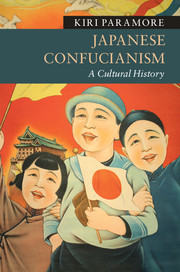Book contents
- Frontmatter
- Epigraph
- Contents
- List of figures
- List of maps
- Acknowledgments
- Notes on the text
- Timeline
- Maps
- Introduction
- 1 Confucianism as cultural capital (mid-first millennium CE–late sixteenth century CE)
- 2 Confucianism as religion (1580s–1720s)
- 3 Confucianism as public sphere (1720s–1868)
- 4 Confucianism as knowledge (1400s–1800s)
- 5 Confucianism as liberalism (1850s–1890s)
- 6 Confucianism as fascism (1868–1945)
- 7 Confucianism as taboo (1945–2015)
- Epilogue: China and Japan: East Asian modernities and Confucian revivals compared
- Notes
- Works Cited
- Index
1 - Confucianism as cultural capital (mid-first millennium CE–late sixteenth century CE)
Published online by Cambridge University Press: 05 April 2016
- Frontmatter
- Epigraph
- Contents
- List of figures
- List of maps
- Acknowledgments
- Notes on the text
- Timeline
- Maps
- Introduction
- 1 Confucianism as cultural capital (mid-first millennium CE–late sixteenth century CE)
- 2 Confucianism as religion (1580s–1720s)
- 3 Confucianism as public sphere (1720s–1868)
- 4 Confucianism as knowledge (1400s–1800s)
- 5 Confucianism as liberalism (1850s–1890s)
- 6 Confucianism as fascism (1868–1945)
- 7 Confucianism as taboo (1945–2015)
- Epilogue: China and Japan: East Asian modernities and Confucian revivals compared
- Notes
- Works Cited
- Index
Summary
On the sixth day of the eighth month in the autumn of the fifteenth year [284CE] a Prince from [the Korean state of] Paekche called Araki came before the court and presented two fine horses to the [Japanese] emperor… This Araki was very good at reading the [Confucian] classics… Hearing this, the emperor asked Araki, “Do you possess a fine Confucian professor [in Paekche]?” Araki replied, “There is one called Wani, he is excellent.” Arata Wake and Kamunaki Wake were dispatched to Paekche to get Wani. In spring in the second month of the sixteenth year Wani arrived. Prince Uji no Waki Iratsuko took him as his teacher. He learnt various classics from Wani. There were none of them he could not master. Wani became the first keeper of the imperial books.
(Nihon Shoki in NKBT 67: 370–3)So began the history of Confucianism in Japan. Confucian professors were fine gifts for princes who could use them as symbols of status and connection. As a prince would show his prowess and exhibit his own status by skillfully riding an especially fine stallion, so too a prince “able to master” all the Confucian classics taught by a fine teacher exhibited not only the status of “having” that teacher but also his own accomplishments in being able to “master” the material. This passage seems to be the first Japanese historical source narrating Confucianism's arrival in Japan. Whether this occurred in 284, as the source could be literally interpreted, or 402, as Peter Kornicki has suggested, or whether this story is just a work of complete fiction from the early eighth-century period in which Nihon Shoki was compiled, we will never really know. What is clear is that Confucianism, its personnel, and texts were initially primarily perceived as part of the status symbolism of East Asian interstate relations.
The beginnings of Confucianism in Japan were thus closely intertwined with the beginnings of a Japanese state. The formation of a single dominant state in central Japan occurred from the fifth to the seventh centuries, concurrently with a new wave of importation and institutionalization of political and religious culture from mainland Asia – notably Korea. The impact of, most importantly, Buddhism, but also Confucianism, and other religious ideas associated with Daoism, accelerated dramatically during the seventh century.
- Type
- Chapter
- Information
- Japanese ConfucianismA Cultural History, pp. 16 - 40Publisher: Cambridge University PressPrint publication year: 2016



